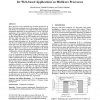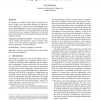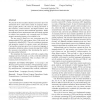125
click to vote
PLDI
2009
ACM
15 years 6 months ago
2009
ACM
Dynamic information flow policies, such as declassification, are essential for practically useful information flow control systems. However, most systems proposed to date that ...
112
click to vote
PLDI
2009
ACM
15 years 6 months ago
2009
ACM
More and more server workloads are becoming Web-based. In these Web-based workloads, most of the memory objects are used only during one transaction. We study the effect of the me...
107
click to vote
PLDI
2009
ACM
15 years 6 months ago
2009
ACM
Parallel platforms are becoming ubiquitous with modern computing systems. Many parallel applications attempt to avoid locks in order to achieve high responsiveness, aid scalabilit...
PLDI
2009
ACM
15 years 9 months ago
2009
ACM
122
click to vote
PLDI
2009
ACM
15 years 9 months ago
2009
ACM
Information flow controls can be used to protect both data confidentiality and data integrity. The certification of the security degree of a program that runs in untrusted envi...
138
click to vote
PLDI
2009
ACM
15 years 9 months ago
2009
ACM
Program errors are a source of information leaks. Tracking these leaks is hard because error propagation breaks out of program structure. Programming languages often feature excep...
109
click to vote
PLDI
2009
ACM
15 years 9 months ago
2009
ACM
In this paper, we initiate a formal study of security on Android: Google’s new open-source platform for mobile devices. Specifically, we present a core typed language to descri...
PLDI
2009
ACM
15 years 9 months ago
2009
ACM
133
click to vote
PLDI
2009
ACM
15 years 9 months ago
2009
ACM
We present the first machine-checked correctness proof for information flow control (IFC) based on program dependence graphs (PDGs). IFC based on slicing and PDGs is flow-sensi...
150
Voted
PLDI
2009
ACM
15 years 9 months ago
2009
ACM
This paper presents λI , a language for dynamic tracking of information flow across multiple, interdependent dimensions of information. Typical dimensions of interest are integr...



